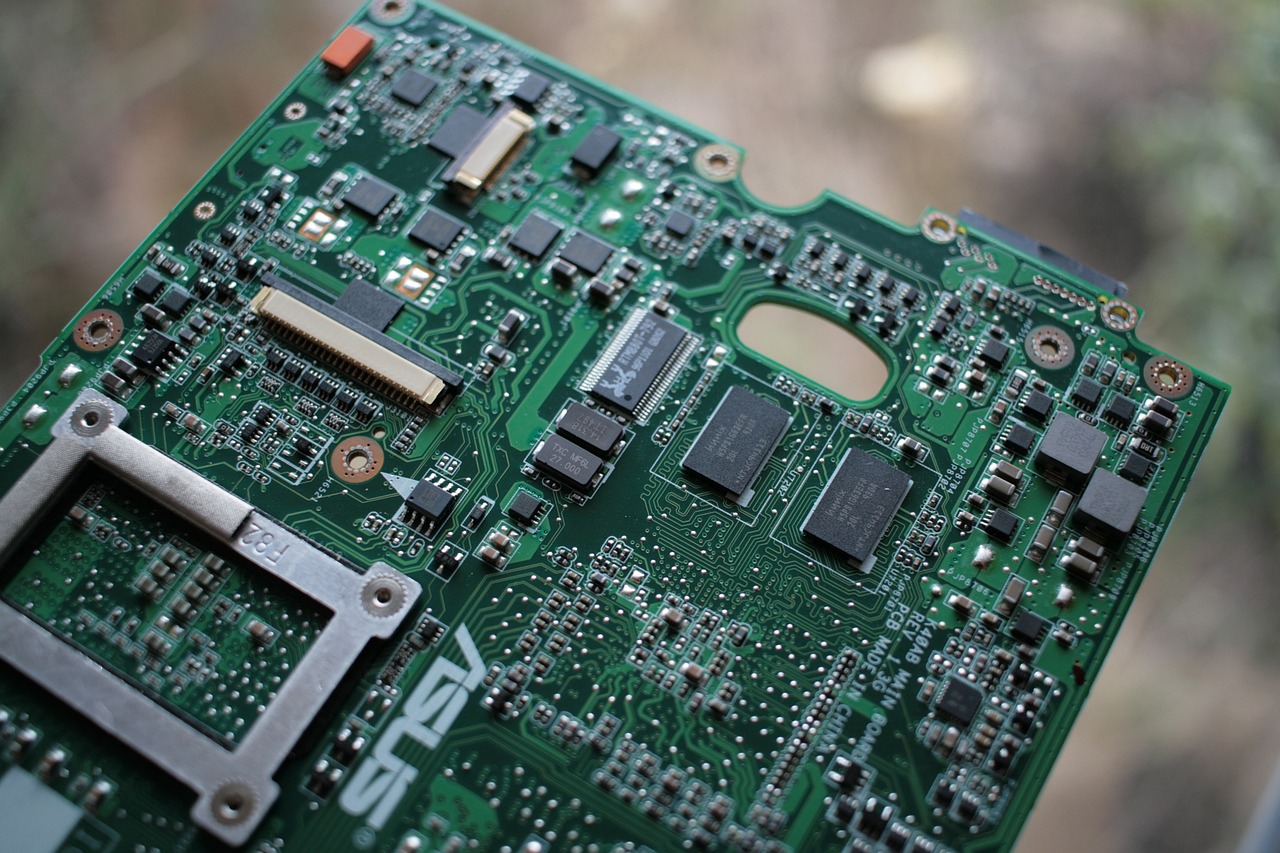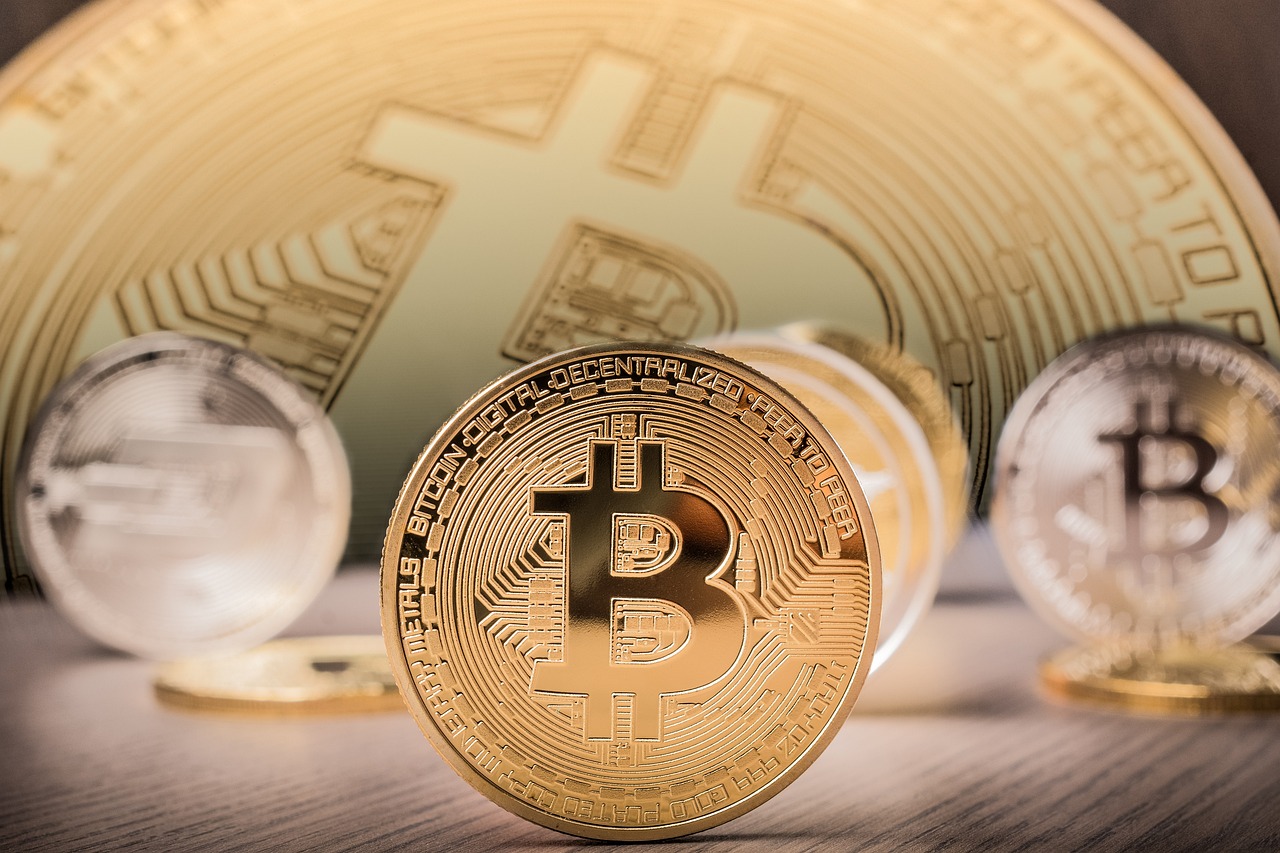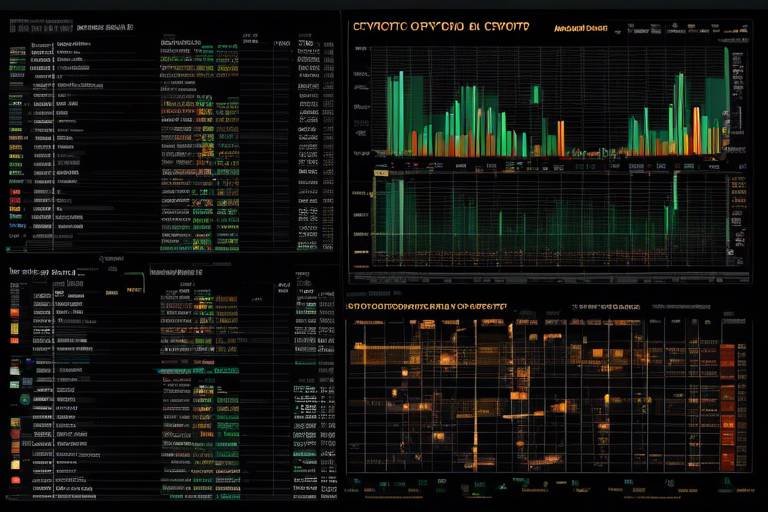The Future of Blockchain in Supply Chain Management
As we step into an era where technology shapes every facet of our lives, blockchain emerges as a beacon of innovation, particularly in the realm of supply chain management. Imagine a world where every product you buy comes with a complete history, from its origin to your doorstep. This is not just a dream; it’s the reality that blockchain technology is paving the way for. By enhancing transparency, boosting efficiency, and fortifying security, blockchain is transforming how businesses operate and how consumers interact with products. In this article, we will explore the profound implications of blockchain in supply chains, the challenges it faces, and what the future holds for various industries.
To appreciate the impact of blockchain on supply chains, we first need to understand what blockchain is. At its core, blockchain is a decentralized ledger system that records transactions across multiple computers. This means that once a transaction is recorded, it cannot be altered retroactively without the consensus of the network, ensuring a level of security and trust that traditional systems simply can't match. Think of it like a digital notebook that everyone can see, but only a few can write in. This transparency is crucial for supply chain management, where trust and verification are paramount.
Implementing blockchain in supply chains is like adding a turbocharger to a car—it significantly boosts performance. The benefits are numerous, and they range from improved traceability to enhanced collaboration among stakeholders. Let's dive deeper into these advantages:
One of the standout features of blockchain is its ability to provide real-time tracking of products throughout the supply chain. Imagine being able to scan a QR code on your product and instantly see its journey from the manufacturer to the store shelf. This enhanced traceability leads to better quality control and a faster response to issues. For instance, if a batch of products is found to be defective, companies can quickly trace back to the source and take corrective actions, minimizing the impact on consumers.
With blockchain, companies can ensure that products meet quality standards at every stage of the supply chain. This is crucial in industries such as food and pharmaceuticals, where maintaining product integrity is essential. By having a transparent record of every transaction and movement, businesses can build consumer trust and verify that their products are safe and compliant with regulations.
Imagine a scenario where a problem arises in the supply chain—perhaps a shipment is delayed or a product is found to be faulty. With blockchain’s transparency, companies can quickly identify where the issue occurred and resolve it efficiently. This leads to less downtime and a more resilient supply chain. The speed at which problems can be addressed is invaluable, especially in today’s fast-paced market.
Fraud and counterfeiting are significant concerns in supply chains, costing businesses billions annually. Blockchain technology significantly reduces these risks by ensuring secure transactions and creating immutable records. Each product can be assigned a unique identifier that is recorded on the blockchain, making it nearly impossible for counterfeit products to infiltrate the market. This not only protects businesses but also safeguards consumers from purchasing fake goods.
While the benefits of blockchain are compelling, implementing this technology in supply chains is not without its challenges. Issues such as scalability, integration with existing systems, and regulatory concerns must be addressed for successful adoption.
As supply chains expand, scalability becomes a pressing concern for blockchain systems. The technical challenges associated with processing large volumes of transactions can hinder performance. Companies need to explore potential strategies to overcome these hurdles, such as utilizing layer-2 solutions or optimizing their blockchain architecture.
Many companies rely on existing systems that may not easily integrate with blockchain technology. This complexity can create barriers to adoption, as businesses must navigate the intricacies of merging new technology with traditional supply chain processes. A thoughtful approach, perhaps starting with pilot projects, can help ease this transition and demonstrate the value of blockchain.
- What is blockchain? Blockchain is a decentralized digital ledger that records transactions across multiple computers securely and transparently.
- How does blockchain improve supply chain management? It enhances transparency, traceability, and security, which leads to better quality control and reduced fraud.
- What are the challenges of implementing blockchain? Key challenges include scalability, integration with legacy systems, and regulatory compliance.

Understanding Blockchain Technology
Blockchain technology is often described as a decentralized ledger system that revolutionizes the way we conduct transactions. Imagine a digital notebook that everyone can see and write in, but no one can erase or alter the entries. This is the essence of blockchain—it's a secure and transparent method for recording information that is immutable, meaning once data is added, it cannot be changed. This foundational principle is crucial for supply chain management, where trust and accuracy are paramount.
At its core, blockchain operates on a network of computers, or nodes, that maintain a synchronized database of records. Each transaction is grouped into a block, and once a block is filled, it is added to the chain in a linear, chronological order. This process not only enhances transparency but also ensures that every participant in the supply chain has access to the same information, reducing the risk of discrepancies. Think of it as a group project where every team member has the same copy of the project file, ensuring no one is working with outdated information.
One of the standout features of blockchain is its use of cryptography to secure data. Each block contains a unique hash (a digital fingerprint) of the previous block, along with a timestamp and transaction data. This creates a chain of blocks that is incredibly difficult to tamper with. If someone tries to alter a block, it would change its hash, breaking the chain and signaling that something is amiss. This feature is particularly beneficial in supply chains, where fraud and counterfeiting can lead to significant losses.
Moreover, blockchain's decentralized nature means that there is no single point of failure. Traditional systems often rely on a central authority, which can be vulnerable to attacks or failures. In contrast, blockchain distributes its data across multiple nodes, making it resilient and secure. This decentralization fosters a sense of collaboration among supply chain partners, as they can trust the data without needing to rely on a third party.
In summary, understanding blockchain technology is essential for grasping its impact on supply chain management. It offers a robust framework for enhancing transparency, security, and efficiency. As we delve deeper into its benefits and applications, you'll see how this technology is not just a trend but a fundamental shift in how businesses operate.
- What is blockchain technology? Blockchain is a decentralized ledger system that records transactions securely and transparently.
- How does blockchain enhance supply chain management? It improves transparency, traceability, and security while reducing fraud and errors.
- What are the challenges of implementing blockchain? Challenges include scalability, integration with existing systems, and regulatory concerns.

Benefits of Blockchain in Supply Chains
Implementing blockchain technology in supply chains is like adding a turbocharger to a standard engine; it significantly enhances performance across the board. Imagine a world where every product's journey from the manufacturer to the consumer is not only visible but also verifiable. This is the promise of blockchain: a transformative force that brings about improved traceability, reduced fraud, and enhanced collaboration.
One of the standout benefits of blockchain is its ability to provide enhanced traceability. With blockchain, each product can be tracked in real-time, from the moment it leaves the factory floor to the time it arrives at your doorstep. This level of transparency ensures that businesses can monitor the entire supply chain process, enabling them to respond quickly to any issues that arise. For instance, if a batch of products is found to be defective, companies can swiftly identify the source of the problem and take corrective actions, minimizing the impact on consumers.
Quality assurance is another critical advantage of blockchain in supply chain management. By utilizing this technology, companies can guarantee that products meet established quality standards at every stage of production. This not only protects the integrity of the product but also builds consumer trust. When customers know that a product's journey is documented and verifiable, they are more likely to feel confident in their purchase decisions.
Additionally, blockchain facilitates faster issue resolution. The transparency that comes with blockchain technology allows for quicker identification of problems within the supply chain. For example, if a shipment is delayed, the stakeholders involved can immediately access the relevant data to pinpoint the cause of the delay, whether it's a logistical issue or a supply shortage. This rapid problem-solving capability minimizes disruptions, ensuring that businesses can maintain their operational efficiency.
Moreover, the implementation of blockchain significantly reduces the risk of fraud and counterfeiting. In a world where counterfeit goods can easily infiltrate the market, blockchain acts as a shield. The secure transactions and immutable records provided by blockchain protect both businesses and consumers. When a product is recorded on the blockchain, it becomes nearly impossible to alter that information without detection. This level of security not only safeguards brands but also ensures that consumers receive authentic products.
In summary, the benefits of blockchain in supply chains are transformative. From enhanced traceability and quality assurance to faster issue resolution and reduced fraud, the advantages are compelling. As businesses continue to explore blockchain technology, it is clear that the future of supply chain management is not just about efficiency; it's about building a system of trust and accountability that benefits everyone involved.
- What is blockchain technology?
Blockchain is a decentralized ledger system that records transactions across many computers securely and transparently.
- How does blockchain improve supply chain management?
Blockchain enhances transparency, traceability, and security in supply chains, leading to better quality control and reduced fraud.
- What industries can benefit from blockchain in supply chains?
Many industries, including food and beverage, pharmaceuticals, and electronics, can leverage blockchain for improved supply chain management.
- Are there challenges in implementing blockchain?
Yes, challenges include scalability, integration with existing systems, and regulatory concerns that need to be addressed for successful implementation.

Enhanced Traceability
In today's fast-paced world, in supply chains is not just a luxury; it's a necessity. Imagine being able to track a product from its origin to your doorstep, knowing every step it took along the way. This is where blockchain technology shines. By leveraging a decentralized ledger, businesses can achieve real-time tracking of their products throughout the entire supply chain. This means that every transaction, every movement, and every change in ownership is recorded and can be accessed at any time. No more guessing games or relying on outdated information!
One of the most significant advantages of enhanced traceability is the impact it has on quality control. When companies can monitor their products at every stage, they can ensure that they meet the highest quality standards. For instance, if a batch of food products is found to be contaminated, blockchain allows for immediate identification of the source. This not only helps in recalling the affected products swiftly but also prevents similar issues in the future. The ability to trace back through the supply chain is like having a roadmap that highlights potential pitfalls before they become a problem.
Moreover, enhanced traceability fosters faster issue resolution. Imagine a scenario where a customer receives a defective item. With traditional supply chains, tracing the root cause can be a painstaking process, often taking days or even weeks. However, with blockchain, the transparency of records allows for quicker identification of problems. Companies can pinpoint where things went wrong in real-time, leading to more efficient problem-solving and minimizing disruptions. This not only saves time but also enhances customer satisfaction, as consumers appreciate quick resolutions to their issues.
To illustrate the importance of enhanced traceability, consider the following table that highlights key benefits:
| Benefit | Description |
|---|---|
| Real-Time Tracking | Ability to monitor products at every stage of the supply chain. |
| Quality Control | Ensures products meet standards and identifies issues swiftly. |
| Faster Resolution | Quick identification of problems leads to efficient solutions. |
In conclusion, enhanced traceability through blockchain technology is revolutionizing supply chain management. It not only improves quality assurance and customer satisfaction but also creates a more resilient supply chain capable of adapting to challenges. As businesses continue to embrace this technology, we can expect to see even more innovations that will reshape the way we think about supply chains.
- What is enhanced traceability? Enhanced traceability refers to the ability to track a product's journey through the supply chain in real-time, ensuring transparency and accountability.
- How does blockchain improve traceability? Blockchain provides a decentralized and immutable ledger that records every transaction, making it easy to trace products back to their origin.
- What are the benefits of enhanced traceability? Benefits include improved quality control, faster issue resolution, and increased consumer trust.
- Can enhanced traceability prevent fraud? Yes, by providing transparent records, enhanced traceability can significantly reduce the risk of fraud and counterfeiting.

Quality Assurance
In today's fast-paced market, ensuring that products meet stringent quality standards is more critical than ever. Blockchain technology emerges as a game-changer in this arena, providing a transparent and immutable record of every transaction and interaction within the supply chain. Imagine a world where every product's journey—from raw materials to the final consumer—is documented in real-time. This level of transparency not only enhances accountability but also builds consumer trust. When customers can trace the origin of their products, they feel more confident in their purchases, knowing that quality has been monitored at every stage.
With blockchain, companies can implement rigorous quality assurance protocols that are automatically recorded on the blockchain. For instance, if a product undergoes testing for safety or quality, the results can be logged directly onto the blockchain. This means that any stakeholder—from manufacturers to retailers—can access this information at any time, ensuring that only products that meet the required standards reach the market. Furthermore, this capability can significantly reduce the likelihood of recalls, as companies can quickly identify and isolate affected batches.
Additionally, the use of smart contracts—self-executing contracts with the terms of the agreement directly written into code—can further enhance quality assurance. These contracts can automatically verify that products meet specific criteria before they are approved for sale. For example, if a supplier fails to meet a predetermined quality standard, the smart contract can trigger a halt in the supply chain process, preventing subpar products from entering the market.
In summary, blockchain not only assures quality but also transforms the entire landscape of product verification. It shifts the focus from reactive measures—like recalls and complaints—to proactive quality management. By leveraging this technology, companies can not only enhance their operational efficiency but also foster a culture of quality that resonates with consumers. As we move forward, the integration of blockchain in quality assurance practices will likely become a standard expectation rather than an exception.
- What is blockchain technology? Blockchain is a decentralized ledger system that records transactions across multiple computers to ensure security and transparency.
- How does blockchain improve supply chain quality assurance? It provides real-time tracking and immutable records, ensuring that products meet quality standards at every stage of the supply chain.
- What are smart contracts? Smart contracts are self-executing contracts with the terms directly written into code, allowing for automatic verification of compliance with quality standards.
- Can blockchain reduce product recalls? Yes, by enabling real-time tracking and quick identification of issues, blockchain can significantly reduce the likelihood and impact of product recalls.

Faster Issue Resolution
In the fast-paced world of supply chain management, speed is often the name of the game. When issues arise—be it a delayed shipment, a faulty product, or a sudden change in demand—companies need to act quickly to minimize disruptions. This is where blockchain technology steps in as a game-changer. With its transparent and immutable nature, blockchain allows for quicker identification and resolution of problems, transforming the way businesses respond to challenges.
Imagine a scenario where a batch of products is found to be defective. In a traditional supply chain, tracking down the source of the problem could take days, if not weeks. Teams would have to sift through mountains of paperwork, communicate with multiple stakeholders, and often, by the time they pinpoint the issue, it may already be too late. However, with blockchain, every transaction and movement of goods is recorded in real-time on a decentralized ledger. This means that the moment a defect is identified, companies can instantly access the entire history of that product, from its origin to its current location.
This level of transparency not only accelerates the investigation process but also enables businesses to implement immediate corrective actions. For example, if a supplier's batch is found to be the culprit, companies can quickly halt further shipments from that supplier and inform customers about potential delays. This swift action helps maintain customer satisfaction and protects the brand's reputation.
Additionally, blockchain's ability to provide a single source of truth means that all parties involved in the supply chain—from manufacturers to distributors, and even retailers—are on the same page. This collaboration reduces the chances of miscommunication, which is often a significant barrier to resolving issues quickly. For instance, if a retailer notices a discrepancy in inventory levels, they can instantly check the blockchain ledger to verify the shipment details, reducing the back-and-forth communication that typically slows down the resolution process.
Moreover, the use of smart contracts—self-executing contracts with the terms of the agreement directly written into code—can automate many aspects of issue resolution. If a shipment is delayed beyond a specified timeframe, a smart contract could automatically trigger penalties or alternative arrangements without the need for human intervention. This not only speeds up the resolution but also ensures that all parties adhere to the agreed-upon standards.
In summary, the integration of blockchain technology into supply chain management significantly enhances the speed at which issues can be resolved. By providing real-time visibility, fostering collaboration among stakeholders, and automating processes through smart contracts, businesses can navigate challenges more efficiently and effectively. This not only saves time and resources but also strengthens relationships with customers and partners, ultimately leading to a more resilient supply chain.
- What is blockchain technology? Blockchain is a decentralized ledger system that securely records transactions across multiple computers.
- How does blockchain improve supply chain transparency? It provides a real-time, immutable record of all transactions, allowing for easy tracking of products.
- Can blockchain reduce fraud in supply chains? Yes, because it ensures secure transactions and maintains an unchangeable record of product origins.
- What are smart contracts? Smart contracts are automated contracts that execute terms of an agreement when specific conditions are met.
- What challenges exist in implementing blockchain? Challenges include scalability, integration with existing systems, and regulatory issues.

Reduced Fraud and Counterfeiting
In today's global marketplace, the threat of fraud and counterfeiting looms large, impacting both businesses and consumers alike. As companies strive to build trust and credibility, the implementation of blockchain technology emerges as a powerful ally in the fight against these pervasive issues. With its secure transactions and immutable records, blockchain offers a robust solution that not only protects products but also enhances the overall integrity of the supply chain.
One of the most significant advantages of blockchain is its ability to provide a transparent and tamper-proof ledger of transactions. Each time a product changes hands—whether it’s from manufacturer to distributor, or from distributor to retailer—this transaction is recorded on the blockchain. This means that every participant in the supply chain has access to the same information, which drastically reduces the chances of fraud. For instance, if a product is labeled as organic, consumers can verify its authenticity by tracing its journey back to the farm where it was grown.
Moreover, the decentralized nature of blockchain technology means that no single entity has control over the entire system. This dispersed authority makes it much harder for fraudsters to manipulate the data. Unlike traditional systems where a central database can be hacked or altered, blockchain's design ensures that any attempt to change a record would require the consensus of the entire network. This high level of security is particularly crucial in industries such as pharmaceuticals, where counterfeit medications can have dire consequences for public health.
To illustrate the impact of blockchain on reducing fraud, consider the following table that outlines the traditional supply chain versus a blockchain-enabled supply chain:
| Aspect | Traditional Supply Chain | Blockchain-Enabled Supply Chain |
|---|---|---|
| Data Control | Centralized | Decentralized |
| Transaction Transparency | Limited | High |
| Risk of Fraud | High | Low |
| Traceability | Challenging | Seamless |
As seen in the table, blockchain technology significantly enhances transparency and traceability, which are vital in combating fraud. With every transaction recorded and visible to all parties, the chances of counterfeit products entering the market diminish dramatically. This not only protects consumers but also safeguards the reputation of brands, fostering a culture of trust.
In conclusion, the implementation of blockchain technology in supply chains is a game-changer in the battle against fraud and counterfeiting. By providing a secure, transparent, and immutable record of transactions, blockchain not only enhances product authenticity but also builds consumer confidence. As more companies recognize the importance of these features, we can expect to see a significant reduction in fraudulent activities across various industries.
- What is blockchain technology? Blockchain is a decentralized ledger system that records transactions across many computers in a way that the registered transactions cannot be altered retroactively.
- How does blockchain reduce fraud? By providing a transparent and tamper-proof record of transactions, blockchain makes it much harder for fraudulent activities to go unnoticed.
- Is blockchain technology widely adopted in supply chains? While adoption is growing, many industries are still exploring how to best integrate blockchain into their existing systems.
- What industries can benefit from blockchain? Industries such as pharmaceuticals, food and beverage, and luxury goods are particularly well-suited for blockchain applications due to the high risks of counterfeiting.

Challenges of Implementing Blockchain
While blockchain technology offers a plethora of benefits for supply chain management, its implementation is not without challenges. The journey towards integrating blockchain into existing supply chains can often resemble navigating a labyrinth—complex, intricate, and sometimes frustrating. One of the most significant hurdles is scalability. As supply chains expand, the volume of transactions increases exponentially. Traditional blockchain systems may struggle to handle this surge, leading to potential delays and inefficiencies. Imagine a highway during rush hour; the more cars you add, the slower traffic moves. This is the scalability issue that many companies face when adopting blockchain.
Moreover, the integration of blockchain with legacy systems poses another substantial challenge. Many companies have established processes and technologies that simply don't mesh well with new blockchain solutions. It’s like trying to fit a square peg in a round hole; the existing infrastructure may not support the seamless flow of data that blockchain requires. Companies must invest time and resources to ensure that these systems can communicate effectively, which can be a daunting task. This complexity can lead to increased costs and longer implementation times, which are not ideal for businesses looking to stay competitive.
Another critical issue revolves around regulatory concerns. The legal landscape surrounding blockchain technology is still evolving, and many companies are unsure of how to comply with existing regulations. Different countries have varying laws regarding data privacy, security, and financial transactions, which can complicate the implementation process. Businesses must navigate this regulatory maze carefully to avoid potential legal pitfalls. It's akin to walking a tightrope; one misstep can lead to significant consequences.
Furthermore, there's the question of education and awareness. Many stakeholders within the supply chain may not fully understand how blockchain works or its potential benefits. This lack of knowledge can lead to resistance against adopting new technology. Companies must invest in training and education to ensure that everyone involved is on the same page. A well-informed team can make all the difference when it comes to successfully implementing blockchain.
Lastly, cost is a considerable factor. While blockchain can lead to long-term savings, the initial investment can be substantial. Companies need to weigh the benefits against the upfront costs, which can sometimes deter them from making the leap. It’s essential to conduct a thorough cost-benefit analysis to determine if the investment is worthwhile.
In summary, while the potential of blockchain in supply chain management is immense, companies must carefully consider these challenges. Overcoming scalability issues, integrating with legacy systems, navigating regulatory landscapes, educating stakeholders, and managing costs are all critical components of a successful blockchain implementation strategy. By addressing these challenges head-on, businesses can unlock the full potential of blockchain technology and reap its numerous benefits.
- What is blockchain technology?
Blockchain is a decentralized ledger system that records transactions across many computers, ensuring that the records cannot be altered retroactively without the alteration of all subsequent blocks and the consensus of the network. - How does blockchain improve supply chain management?
Blockchain enhances supply chain management by providing increased transparency, traceability, and security, which helps in reducing fraud and improving collaboration among stakeholders. - What are the main challenges of implementing blockchain?
The main challenges include scalability, integration with legacy systems, regulatory concerns, lack of education and awareness, and the initial cost of implementation. - Is blockchain technology secure?
Yes, blockchain technology is generally considered secure due to its decentralized nature and cryptographic algorithms, which make it difficult for unauthorized parties to alter records.

Scalability Issues
As supply chains expand and evolve, the scalability of blockchain technology becomes a crucial concern. Imagine a bustling highway during rush hour; if too many vehicles try to merge into a single lane, chaos ensues. Similarly, as more transactions are added to a blockchain network, the system can face significant bottlenecks. The core of the scalability issue lies in the way blockchain processes transactions. Traditional blockchain systems, like Bitcoin, can handle only a limited number of transactions per second, which can lead to delays and increased costs when demand surges.
To put it into perspective, let’s compare different blockchain technologies based on their transaction speeds:
| Blockchain | Transactions Per Second (TPS) |
|---|---|
| Bitcoin | 7 |
| Ethereum | 30 |
| Ripple | 1,500 |
| Solana | 65,000+ |
As seen in the table above, there is a stark difference in the transaction capabilities of various blockchains. While some can handle a handful of transactions, others are designed for high throughput. This disparity raises questions about which blockchain technology is best suited for large-scale supply chain operations. Companies need to consider not just the current transaction volume but also future growth. If a business anticipates rapid expansion, opting for a blockchain solution that can scale effectively is essential.
Another layer of complexity arises from the need for interoperability between different blockchain systems. Many organizations may find themselves using multiple blockchain platforms, each with its own protocols and standards. This lack of cohesion can lead to inefficiencies and increased operational costs. Imagine trying to communicate with someone who speaks a different language; without a common ground, the conversation becomes frustrating and unproductive. Similarly, without standardized protocols, the potential of blockchain in supply chain management is hindered.
To tackle these scalability challenges, several strategies are being explored:
- Layer 2 Solutions: These are secondary frameworks built on top of existing blockchains that enhance transaction speed and efficiency. For example, the Lightning Network for Bitcoin allows for faster transactions without congesting the main blockchain.
- Sharding: This technique involves breaking the blockchain into smaller, more manageable pieces, or "shards," which can process transactions simultaneously, thereby increasing overall throughput.
- Hybrid Models: Combining public and private blockchains can offer the best of both worlds, allowing businesses to maintain privacy while benefiting from the transparency of public networks.
In conclusion, while scalability issues present significant challenges for blockchain in supply chain management, they are not insurmountable. By embracing innovative solutions and fostering collaboration among industry players, it is possible to develop a robust blockchain framework capable of supporting the dynamic needs of modern supply chains. The journey may be complex, but the potential rewards—enhanced efficiency, transparency, and security—make it worthwhile.
- What is blockchain scalability?
Scalability in blockchain refers to the ability of the network to handle an increasing number of transactions without compromising performance. - Why is scalability important for supply chains?
As supply chains grow, they require a system that can efficiently process a high volume of transactions to avoid delays and increased costs. - What are some solutions to scalability issues?
Solutions include Layer 2 solutions, sharding, and hybrid blockchain models that enhance transaction speed and efficiency.

Integration with Legacy Systems
Integrating blockchain technology with existing legacy systems can feel a bit like trying to fit a square peg into a round hole. Many companies have invested heavily in their current supply chain infrastructure, and the thought of overhauling these systems to accommodate blockchain can be daunting. However, the reality is that successful integration is not only possible but essential for businesses looking to stay competitive in this rapidly evolving landscape.
One of the primary challenges lies in the technical compatibility of legacy systems with blockchain platforms. These older systems often operate on outdated technology that may not support the requirements of modern blockchain solutions. For instance, legacy systems may lack the necessary APIs (Application Programming Interfaces) that facilitate communication with blockchain networks. This can lead to data silos where information is trapped within one system, preventing the seamless flow of data across the supply chain.
Moreover, the cultural shift required to adopt blockchain can be significant. Employees accustomed to traditional methods may resist the changes that blockchain brings. Training and education become crucial components of a successful integration strategy. Companies must invest time and resources in helping their workforce understand how blockchain works and the benefits it brings to the supply chain. This is not just a technical upgrade; it’s a transformation in how business is conducted.
To address these integration challenges, businesses can consider a phased approach. Instead of attempting a complete overhaul, they can start by identifying specific areas within their supply chain where blockchain can add immediate value. For example, they might begin with a pilot project focused on tracking a particular product line. This allows the company to test the waters and gradually build expertise without overwhelming their existing systems.
Additionally, partnering with technology providers who specialize in blockchain solutions can ease the integration process. These experts can offer insights and tools that facilitate the merging of blockchain with legacy systems. By leveraging their knowledge, companies can avoid common pitfalls and ensure a smoother transition.
Ultimately, while the journey to integrate blockchain with legacy systems may be challenging, the rewards can be substantial. By enhancing transparency, improving traceability, and fostering collaboration, businesses can unlock new levels of efficiency and security that were previously unattainable. As the supply chain landscape continues to evolve, those who embrace this technology will be well-positioned to thrive in the future.
- What is blockchain technology?
Blockchain technology is a decentralized ledger system that securely records transactions across multiple computers, ensuring that the data is transparent and immutable.
- How does blockchain improve supply chain management?
Blockchain enhances supply chain management by providing real-time tracking, improving traceability, reducing fraud, and fostering collaboration among stakeholders.
- What are the challenges of integrating blockchain with legacy systems?
Challenges include technical compatibility, resistance to change, and the need for training and education for employees.
- Can blockchain be integrated gradually?
Yes, a phased approach can be effective, allowing companies to pilot blockchain in specific areas before a full-scale implementation.
Frequently Asked Questions
-
What is blockchain technology?
Blockchain technology is a decentralized ledger system that records transactions across many computers in a way that the registered transactions cannot be altered retroactively. This ensures a high level of security and transparency, making it particularly useful in supply chain management.
-
How does blockchain enhance traceability in supply chains?
Blockchain allows for real-time tracking of products throughout the supply chain. This means that each step a product takes can be recorded and verified, leading to better quality control and faster responses to any issues that may arise.
-
Can blockchain reduce fraud in supply chains?
Absolutely! One of the key benefits of blockchain is its ability to create immutable records that are secure and tamper-proof. This significantly reduces the risk of fraud and counterfeiting, protecting both businesses and consumers.
-
What are the main challenges of implementing blockchain in supply chains?
Implementing blockchain isn't without its hurdles. Some of the main challenges include scalability issues, the need for integration with existing legacy systems, and navigating regulatory concerns. Each of these can complicate the adoption of blockchain technology.
-
How can companies overcome scalability issues with blockchain?
To tackle scalability issues, companies can explore various solutions such as using layer 2 scaling solutions, optimizing blockchain protocols, or even adopting hybrid models that combine private and public blockchains to enhance performance.
-
Is blockchain technology suitable for all types of supply chains?
While blockchain offers numerous benefits, its suitability can vary depending on the specific needs of a supply chain. Industries that require high levels of traceability and security, such as food and pharmaceuticals, may benefit the most from its implementation.
-
What role does transparency play in supply chain management?
Transparency is crucial in supply chain management as it builds trust among stakeholders. With blockchain, all parties can access the same information, which helps in identifying issues quickly and ensuring accountability throughout the supply chain.



















